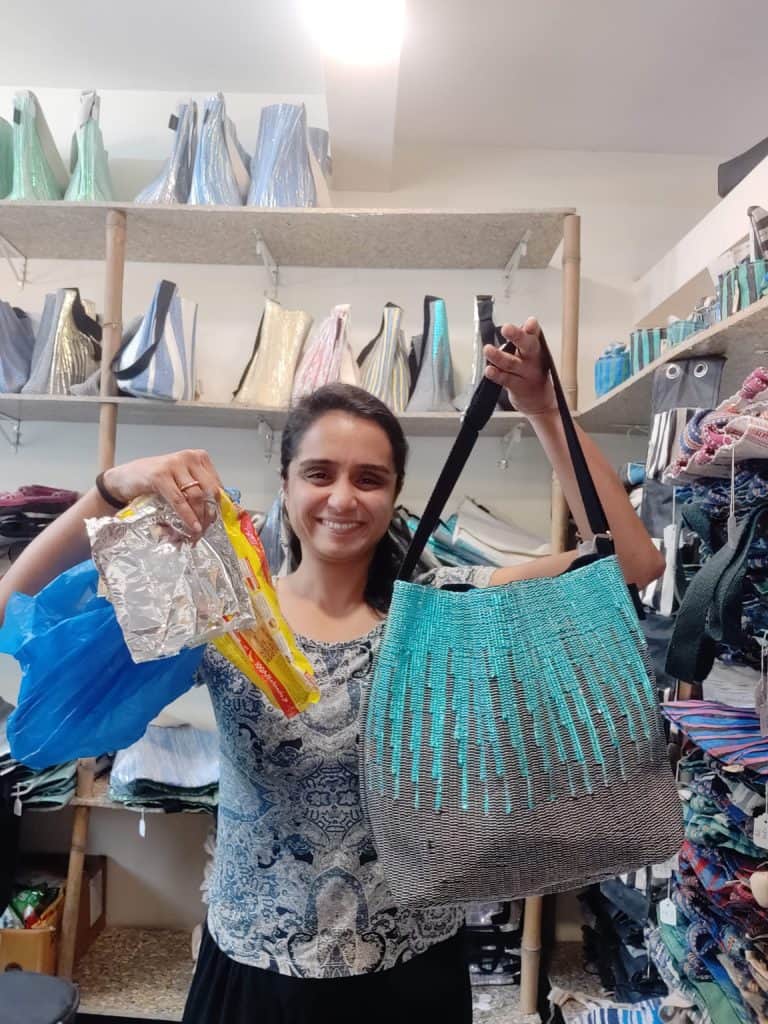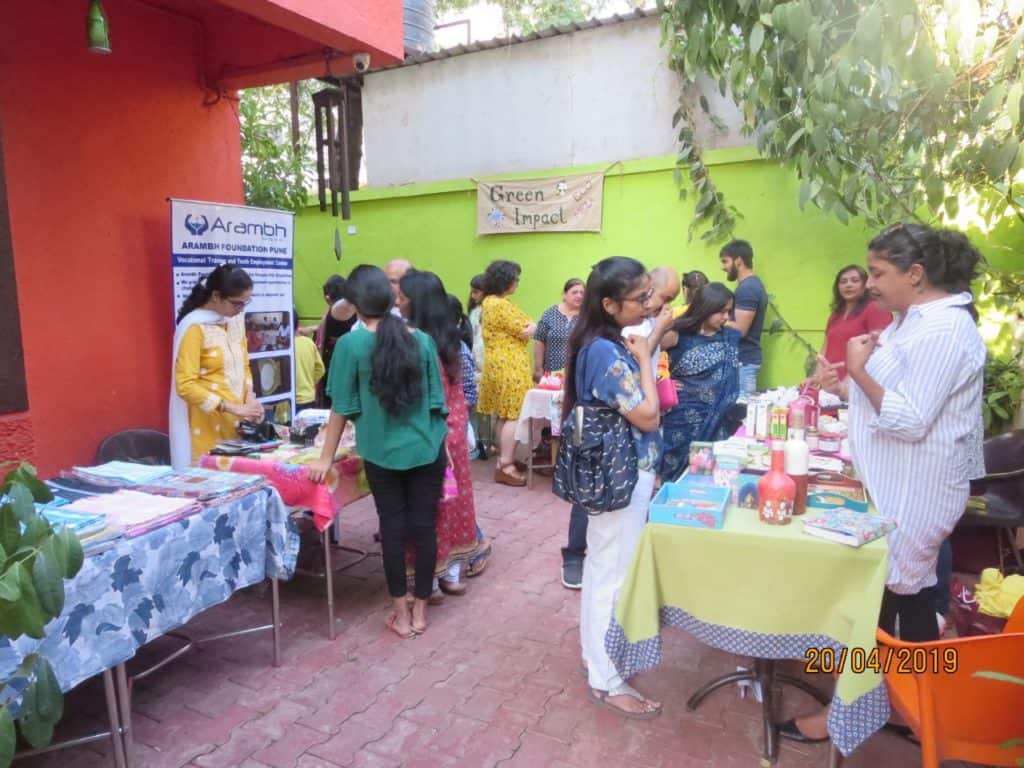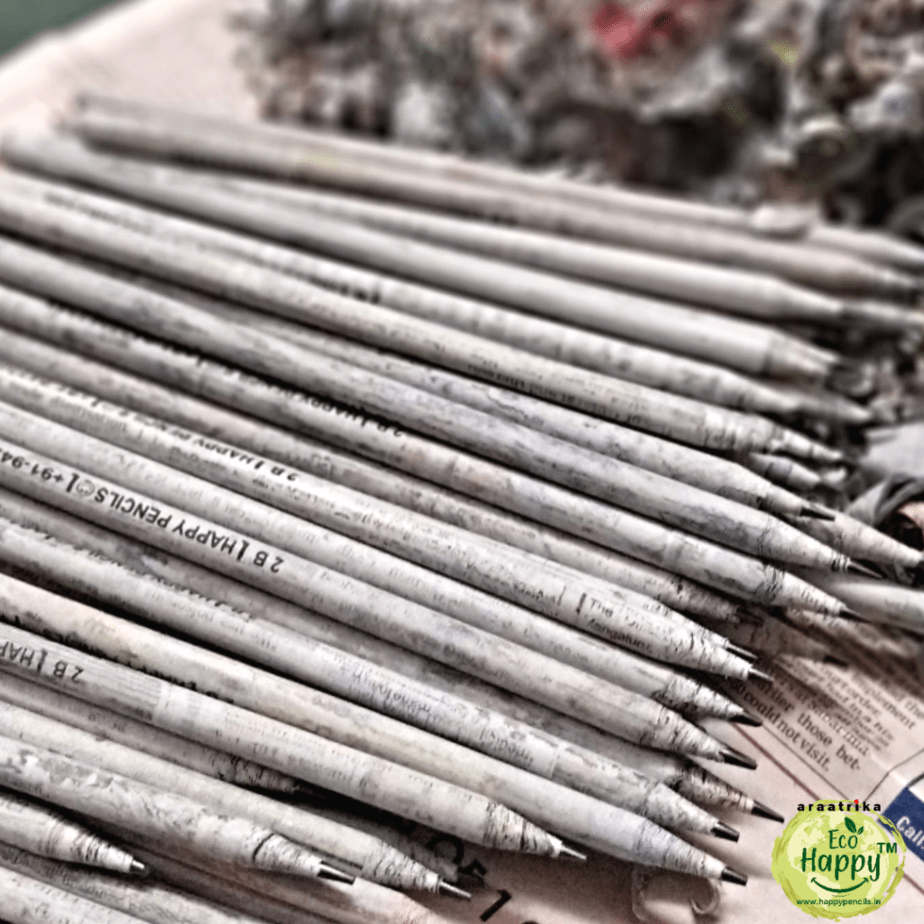Around five years ago, Suvarna Sane was looking for unique products to gift during a get-together. At one exhibition of women entrepreneurs, Sane came across upcycled products of reCharkha. “I was always an environmentally conscious buyer and the purses and totes from upcycled plastic appealed to me,” says Sane, a government servant. “My friends and relatives also appreciated them.”
Sane later learnt that Amita Deshpande and her team at reCharkha also accepted plastic bags as donation. “I went to her workshop, which was also their tailoring unit, with my plastic bags,” adds Sane. “I was impressed with their work and vision and now I am ensuring that my plastic waste goes to reCharkha. My daughters are also following this. I use a lot of reCharkha stuff: my lunch bag, sling purse, tote bag is all bought from reCharkha. If you compare their products, with other mass produced goods in plastic or other material, you are bound to think that reCharkha products are expensive. But if you think holistically about their work, about reducing plastic in our surroundings, the products are worth buying and gifting.”
reCharkha is not the only organisation working to reduce/reuse plastic waste. There are others too in Pune who are contributing in ways big and small towards that goal. We spoke to three women social entrepreneurs who are trying to create awareness about usage of plastic, dumping trash in the landfills and offering sustainable alternatives.
Amita Deshpande, founder of reCharkha, believes that the best way to fight plastic pollution is to ‘refuse’ it in the first place, ‘reduce’ it and lastly recycle it. The former IT engineer started reCharkha, a for profit entity that recycles or upcycles plastic bags into designer handbags, sling purses and so on.

“I have been trekking since my childhood and I found waste and trash in the valleys and mountains distressing,” says Amita. “I used to tell everybody to not use plastic. But not many seemed to understand the gravity of the situation. I took the decision of leaving my IT career, and took up a Master’s programme in America focusing on sustainable development. I returned to India in 2013 and started Aarohana Eco-Social Foundation as a consultancy. We took up a lot of projects on CSR and sustainability. However, I realised that I wasn’t satisfied doing only consultancy. We took up this project of recycling plastic bags in 2015. This year, my business partner in Aarohana decided to part ways, and so we dissolved Aarohana. Almost immediately, I founded reCharkha Ecosocial.”
The project of recycling plastic bags also focused on generating livelihood as Amita realised she could convince people to be more environment conscious only when they had food in their tummy. “We decided that we will take up a role in livelihood generation with a focus on waste management. This project was born as a result. It has been more than five years now that I have been in this field and it has been a good journey,” she adds.
With the help of her family, Deshpande built a few rooms in Silvassa (Dadra and Nagar Haveli UT), where she hails from. She employs 12 tribal youngsters who clean and sanitise the plastic bags in water and bio-degradable solution and then they cut the bags into strips. These strips are then woven onto the looms. The making, designing and marketing of the bags was developed in Pune.
“Currently, all our products are sold online,” says Amita. “We have about 20 products including cushions in home décor, electronic cases, sports bags, besides totes, purses and pouches. We can customise gifts for festivals and New Year. The clients can list what they would like, sizes, shapes and colours and we will put the hampers together for them. They can also gift vouchers, starting from Rs 500 to 5000, from reCharkha.”
Amita has also set up an NGO, My Eco-Social Planet, which works on creating awareness. “We held awareness sessions in some housing societies in Pune and organised collection drives”.
Educating people
Journalist Mita Banerjee is part of Team Miracle, which works as a support group for paraplegic soldiers, poor cancer patients, orphans and destitute women in Pune. In recent years, Team Miracle has also taken up a range of environmental activities. She and her team are educating citizens on how to segregate their garbage and how to recycle it.
“It’s difficult to set a specific date when we started,” says Mita. “As a journalist, I had come in contact with some social organisations who were rendering much-needed help in many sectors. We became a link between those who need help, and those who want to give help. About six years ago, when Prime Minister Narendra Modi started the Swachh Bharat Abhiyan, Team Miracle began to include various environmental activities, as Eco-Warriors”.
“In our seminars on Solid Waste Management, we request people to segregate each of their household waste – not just wet and dry,” says Mita. “The dry waste has to be further segregated – like plastic, glass, paper, e-waste, cardboard etc. All you need is a separate bin or bag for each item, and being thoughtful when you chuck your trash. But people don’t want to take this effort,” she says.
“It’s not enough to preach, you have to give people alternatives for plastic,” adds Mita. Therefore, Team Miracle began holding Green Impact melas in schools, colleges, cafes and invited green entrepreneurs to showcase and sell their products.

“We promote a simple sustainable product like the bamboo toothbrush which is totally bio-degradable. We tell people that every toothbrush they’ve used since childhood is still lying around somewhere; that’s more than 150 million plastic toothbrushes chucked into the garbage bin every month. Imagine the huge quantities of plastic pollution they’re causing…,” says Mita.
In the course of her work, the journalist has met enterprising and creative people who think out-of-the-box, and are taking all our junk, and turning them into something useful.
Mita lists a few such people. Dr Medha Tadpatrikar from Pune, who founded Rudra Environmental Solutions, has developed a technology to recycle any type of plastic and turn it into a poly-fuel. They collect household waste plastic, make this polyfuel, which is then distributed to rural women for cooking purposes.
Then there’s Chetan Zope, an engineer from College of Engineering, Pune, who’s turned to recycling the waste banana stems he saw lying around, and turned them into beautiful paper.
Buying sustainable
An architecture graduate, Jagruti Khabiya-Jain through her brand Araatrika is offering a range of pencils and pens made from paper and seeds, seed paper diaries, travel kit and so on.
Started in 2017, Araatrika was selected as one of the top 100 innovators/start-ups by Maharashtra government in 2018. The co-founder and creative head says that the brand’s mission is to save trees.
“We are using tulsi and marigold seeds for the covers of Plant Me diaries cover and the papers contain seeds,” says Jagruti. “Once you have used the Plant Me diary, you can compost the pages and the cover. Similarly, pencils contain seeds of herbs and vegetables.”

Araatrika has sold around 8 lakh pencils, 5,000 fabric diaries and another couple of thousand ‘Plant Me’ diaries in the past four years. It is also collaborating with stores that are focused on selling sustainable options.
“In Pune, our products are displayed at stores like Pagdandi – The Book Chai Café, Artetc, Tribal Chhatri, Either Or, Venus and Comet,” says the entrepreneur. “We supply to a few stores like Go Native in Bengaluru and also have a branch office there. When Araatrika was started, its clientele mostly comprised well off people who are environmentally aware. But we are reaching out to masses now and that’s a good sign. Happy pencils is now no longer just a gift option. It’s not yet being used as regular stationery, but we are getting regular customers now”.
There was hardly any domestic sale during the lockdown, but post-August Araatrika’s export sales picked up. “During the lockdown sales were mainly in travel kits. The pencils, pens didn’t sell because major hotel chains in the city to whom we were supplying had to close and schools were shut. Post-August, exports picked up. We have distributors in UK and UAE, and clients in Israel and Bhutan”.
“We had launched a Diwali hamper, which includes a steel tea infuser,” says Jagruti. “Basically, the tea bags are non bio-degradable, including the green tea bags. So the hamper has a steel tea infuser and loose green tea leaves, which can be reused. It also contains colours, a Mandala book and some chocolates. It’s like a happy mental health hamper”.
Aratrika also developed a travel kit. “People are a lot more hygiene conscious now, so the travel kit also called a zero waste kit did well,” says Jagruti. “It’s in the form of a bundle with a hook – you can put it on your bag or you can attach it to the belt/hook of your trousers. It includes a steel straw, a steel spoon, a steel fork and knife, one napkin, one paper pen and one paper pencil and the hook. It all comes in a proper kit, which was first launched in 2018, and you roll it up and tie it.”
“I got to know about Araatrika through my friend who had bought some pencils from Araatrika as a return gift for her daughter’s birthday,” says Bengaluru based Riya Thakkar. “Every festive season Jagruti launches something new and this year on Rakshabandhan, I bought eco-friendly rakhis for my brothers.”
The rakhis contained seeds and Thakkar’s brothers loved the idea and they grew chillies and tomatoes out of the seed rakhis.
Thakkar also bought colouring pencils and Mandala colouring book for her family members. “What I like best about Araatrika is they bring out eco-friendly products for every festive season and occasion; they inspire everyone to choose that lifestyle.”
COVID-19 effect
The ban on single-use plastic in Maharashtra was first implemented in 2018 and has the support of the present day Maha Vikas Aghadi government. However, in recent months, plastic usage has gone up and activists worry it may be difficult to curb this rise.
“People have become paranoid…so no matter how many recycling or upcycling programmes are started, it’s not going to be enough,” says Amita Deshpande. “We have to double our efforts on awareness-generation that plastic shouldn’t be used in the first place.” Amita’s Silvassa unit recycles approximately a tonne of plastic in three months.
Team Miracle’s awareness work was affected by the lockdown. They couldn’t hold their regular programmes. But they went digital and posted messages on Facebook and WhatsApp.
Terming the huge increase of single use plastic during the pandemic as ‘alarming’, Mita says, “Whether it’s gloves, masks, PPE kits, testing kits there is a huge increase in plastic usage. Most people are relying on home deliveries which come wrapped in layers of plastic. Also, the food, water, medicines served at the various COVID centres is coming in disposable trays, bottles, packs. Three times more plastic is being used and just thrown away. The war against plastic has now been totally relegated to the back-burner, but we need to revive it.”
Very well written ARTICLE… HATS OFF TO THE Environment Friendly Women… ?
Well informed about eco friendly products.
We are organizing a workshop on sustainable plastic management at COEP and would be happy to have your session on creative interventions in plastic management during 11-16 January 2021.
Please contact Dr. Mahesh Shindikar at maheshshindikar@gmail.com